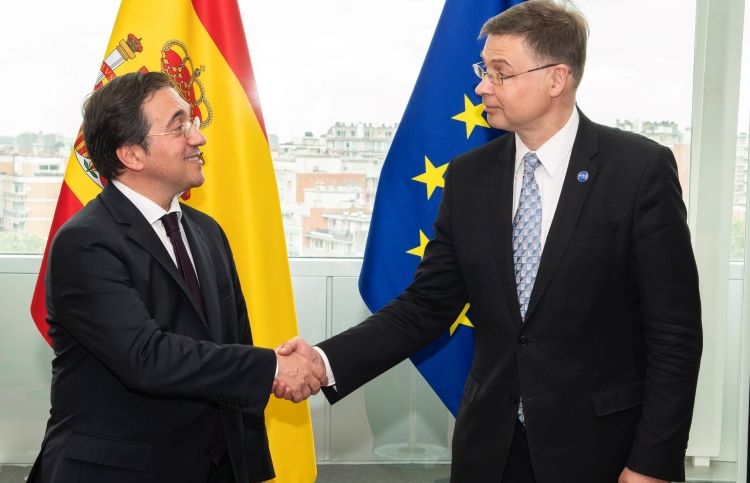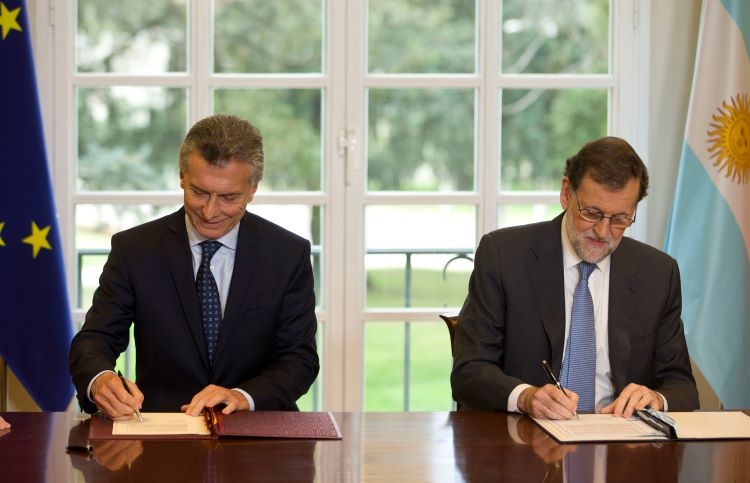The Diplomat
Foreign Minister José Manuel Albares yesterday secured the support of the European Commission against the trade restrictions imposed by Algeria on Spain in retaliation for the change of course of Pedro Sánchez’s government on Western Sahara.
“We have noted the rejection of the European institutions, which is also our rejection,” Albares told the press shortly after meeting in Brussels with the Vice President of the Commission and European Commissioner for Trade, Valdis Dombrovskis, to address Algeria’s double decision to suspend the Treaty of Friendship, Good Neighborliness and Cooperation with Spain and to freeze direct debits related to foreign trade operations of products and services to and from Spain.
“The unilateral measure” by Algeria “violates the Association Agreement between the EU and that country and, therefore, although it is directed at Spain, it affects the single market, Algeria’s economic and trade relations,” the minister warned. “We will remain in contact. We are confident that a quick solution will be found to fully restore trade and investment relations,” Valdis Dombrovskis said, for his part, via his Twitter account.
Shortly after the meeting between the Spanish minister and the European commissioner, Dombrovskis and the EU High Representative for Foreign Policy, Josep Borrell, issued a joint statement in which they warned that the decision taken by Algeria to suspend the Treaty of Friendship and Good Neighborliness signed with Spain in 2002 is “of utmost concern” and announced that the Commission is “assessing the implications of the Algerian actions, including the instruction given to the financial institutions to stop transactions between the two countries, which upfront appear to be in violation of the EU-Algeria Association Agreement, in particular in the area of trade and investment.”
“This would lead to a discriminatory treatment of an EU Member State and adversely affect the exercise of the Union’s rights under the Agreement,” the text adds. “Trade policy is an exclusive EU competence, and the EU is ready to stand up against any type of coercive measures applied against an EU Member State,” it continues. “However, the EU continues to favour dialogue first to solve controversies” and, for that reason, the Commission remains “in close contact with the Spanish Government and reaching out to the Algerian authorities to rapidly clarify the situation,” it adds.
In a statement, the Algerian mission to the European Union yesterday accused the European Commission of having reacted, “without prior consultation or verification with the Algerian government, to Algeria’s suspension of a bilateral political treaty with a European partner, in this case Spain”, and assured that the actions taken by Algeria did not include the freezing of current transactions with Spain. It also affirmed that gas supplies to Spain are not at risk and that it is up to the commercial companies “to assume all their contractual commitments”.
According to Albares, the Government’s top priority at this time is the “firm defense of our companies and the interests of Spain, which are also European companies and the interests of the European Union”, as well as the recovery, “as quickly as possible”, of “normal economic and trade relations”. “Spain’s wish is that this be resolved as soon as possible through dialogue” because “Spain wants to have exactly the same relations with Algeria as with all its neighbors,” he continued. These relations must be “based on friendship, mutual respect and non-interference” because “we are friendly peoples, but also free and sovereign, and the EU and its institutions see it exactly as we do,” he said. As for the possible problems for the gas supply, the Foreign Minister expressed, once again, his wish that “Algeria will continue to play the same role as always, that of a reliable supplier that has given so much stability”.
The PP registers the request for Sanchez to appear before Congress
Albares harshly criticized the PP, which yesterday registered in Congress a request for the appearance of President Pedro Sánchez so that he “gives the appropriate explanations” on the Algeria crisis, a crisis that, according to the spokeswoman of the Popular Parliamentary Group, Cuca Gamarra, is the result of “a disastrous foreign policy that the president is carrying out and that is his responsibility.” “There are times when we are government and opposition, but there are other times when we have to be Spain, and anything less than that seems to me to be an enormous disloyalty and irresponsibility,” warned the Foreign Minister.
In the same vein as the EU, the First Vice-President, Nadia Calviño, declared yesterday that trade relations “are not national, they are European”, and the Minister of Industry, Trade and Tourism, Reyes Maroto, assured that the Association Agreement between the European Union and Algeria on foreign trade was being reviewed “to see if it is being violated”. The president of the CEOE, Antonio Garamendi, yesterday described the crisis with Algeria as “very worrying” and defended the “diplomacy” to “try to get in touch and fix the issue”. According to data from the latest Enagás Statistical Bulletin, natural gas exports to Spain from Algeria fell by 4.7% in May compared to April, while exports to France soared to record highs.
For her part, the second vice-president and leader of Unidas Podemos (minority partner in the coalition government), Yolanda Díaz, recalled that the position of her party with regard to the change of position on Western Sahara is “known”, but specified that she was “aware” that both Pedro Sánchez and José Manuel Albares are “working to redirect this situation”.
Meanwhile, the Ministry of the Interior yesterday ruled out the possibility that the diplomatic crisis will accelerate the irregular arrivals of immigrants. In this regard, the PP also requested the urgent appearance of the minister, Fernando Grande-Marlaska, in Congress to explain his measures in the face of “the massive arrival” of immigrants to the Spanish coasts this summer, which “will worsen” with the current situation. Police authorities in the Balearic Islands, Almeria and Murcia have already warned that “a hot summer” is expected in this regard. Last Tuesday, 113 immigrants from Algeria arrived in the Balearic Islands aboard six small boats, the highest number all year, according to the Government Delegation.
In the midst of all this crisis with Algeria, the spokesman of the Moroccan Government, Mustapha Baitas, declared this Thursday that the implementation of the roadmap established last April 7 by Pedro Sánchez and King Mohammed VI is advancing “at a very satisfactory pace”.







